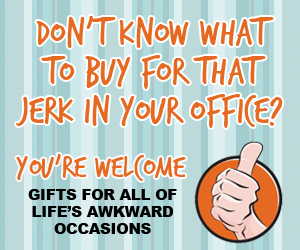[Fips Was There...] The Food Truck Vs. Brick & Mortar Debate!
 Kerri |
Kerri |  Thursday, August 25, 2011 at 7:00AM
Thursday, August 25, 2011 at 7:00AM 
New column alert! We here at FIPS spend a hell of a lot of time out and about in Brooklyn, attending outdoor concerts, comedy shows and various other events. So [FIPS Was There...] is where we're gonna' talk about all this shit.
This past Tuesday Gelf Magazine hosted their recurring Non-motivational Speaker series at the spacious Tea Lounge on Union. The theme of the evening - a hot button in this nabe as of lately - was Food Trucks and Restaurants: Can't We All Just Get Along? The panel included a nice balance of characters, including a restaurant owner, a food truck owner and a food blogger. The evening was informative, and I think everyone involved wants to work toward a day when food trucks and brick and mortar restaurants can exist in harmony. Let's meet the panelists, shall we?
 From L to R: David Weber, Gelf host Adam Rosen, Brian Hoffman, Irene LoRe
From L to R: David Weber, Gelf host Adam Rosen, Brian Hoffman, Irene LoRe
Irene LoRe, a Director of the Brooklyn Chamber of Commerce and co-owner of Aunt Suzie's.
David Weber, the founder and President of the NYC Food Truck Association and the co-founder of The Rickshaw Dumpling Truck (and Bar).
Brian Hoffman, a blogger for Midtown Lunch and Eat This NY.
The panel was moderated by Gelf Magazine's Adam Rosen.
The debate centered on the rights of the food truck owners, the ups and downs of operating each type of business and how food trucks and brick and mortar businesses might find a way to get along in New York City.
Here were some points discussed:
ARE FOOD TRUCKS TAKING AWAY BUSINESS FROM LOCAL RESTAURANTS?
Irene says yes, absolutely. "The Van Leeuwen Ice Cream Truck parks right in front of Trois Pommes and takes away their revenue," she griped. "It's unfair competition. A guy in a truck is not paying rent." Though David, a food truck owner himself, mentioned that food trucks can't legally vend within twenty feet of a restaurant, Irene explained that those laws aren't enforced. "You get the cops down there," she told David."Because I can’t."
An audience member asked Irene if she had access to Trois Pommes revenue to see if in fact their numbers had gone down as a result of the ice cream truck out front. She did not.
Food blogger Brian says that food trucks bring more people to the neighborhood. "Food truck rallys are exciting on the weekends," he explained. "They bring people to that neighborhood." David chimed in, adding that he ran into friends that came to Grand Army Plaza all the way from the Upper East Side just for the rally. "Did they go shopping in the neighborhood afterwards? I have no idea."
BOTH GIVE TO THE COMMUNITY.
Irene has been actively engaged in the local restaurant business since 1982. She was one of the first to open a restaurant on 5th avenue and is considered a pioneer in its development. "We’re committed to the neighborhood," she said. "There isn’t anything you can’t get on 5th Ave. What we get is unfair competition from these trucks. We give to the schools. We give to the parks."
David says the same goes for the food trucks. "Each food truck pays a fee to the park, and that fee is used to support the parks and to approve the amenities there. The city gets money through sales tax. Some goes to the city, some to the MTA and some to the state." In addition, he explains, "Food trucks are stimulating tourism."
WHY BUSINESS CAN BE HARD FOR EVERYONE.
Irene reiterated what we all know to be true: It's expensive as hell to open a restaurant. "Hundreds of thousands of dollars are invested," she said. "And we’re continually fined, inspected and ticketed." Of the food trucks, whose overall costs she said were much cheaper, she recommended that their perching spots be sold like real estate. "It costs more money to run a restaurant," she added. "So we can’t compete on price."
David countered with the downs of owning a food truck. "Working in a food truck is really hard," he explained. "It’s a great business if you want to be a peddler. You work on your food truck 14 hours a day. When it rains, no one comes. If you think it’s a scalable business model you’re sorely mistaken. While you aren’t paying rent, you are paying a host of other costs that make up for that margin. DOH, more for electricity, parking fines, parking meters. Sales are seasonal and subject to weather, much more so than a brick and mortar restaurant. I have both. The restaurants are super easy to run. 20% at restaurant, 80% food truck. You’re not going to have a chain of food trucks like restaurants."
Brian the blogger explained that with a restaurant you're getting a completely heightened experience than what you get from a food truck. You can brave weather elements and sit inside to eat. You're waited on by a server. It's different from getting food to go.
HOW TO COEXIST.
Irene said that she'd like to have an event in Grand Army Plaza similar to the monthly Food Truck Rally. "A Taste of 5th Avenue," she called it.
David agreed that it was a great idea. "That’s a great opportunity for you to go to them and present an event for the local restaurants to showcase." He also explained that as President of the NYCFTA he tries to educate food truck owners to vend responsibly. "It’s in poor taste to put a dumpling truck in front of a dumpling restaurant," he said. "We try to educate all new trucks that come onto the scene. We talk to local businesses to see where they’d be comfortable having us. We run seminars to train people on how to find locations."
As far as keeping food trucks from parking directly in front of restaurants, he said that a big step will be making sure food truck vendors, restaurants owners and the NYPD are all aware of the rules and regulations of food truck occupation. "It’s hard to know what the laws are, they’re tucked into lots of areas. This would be a great place to start."
Indeed it would be.
Want to hear EVEN MORE about this issue? You can read additional interviews with the panelists on Gelf's website.






Reader Comments